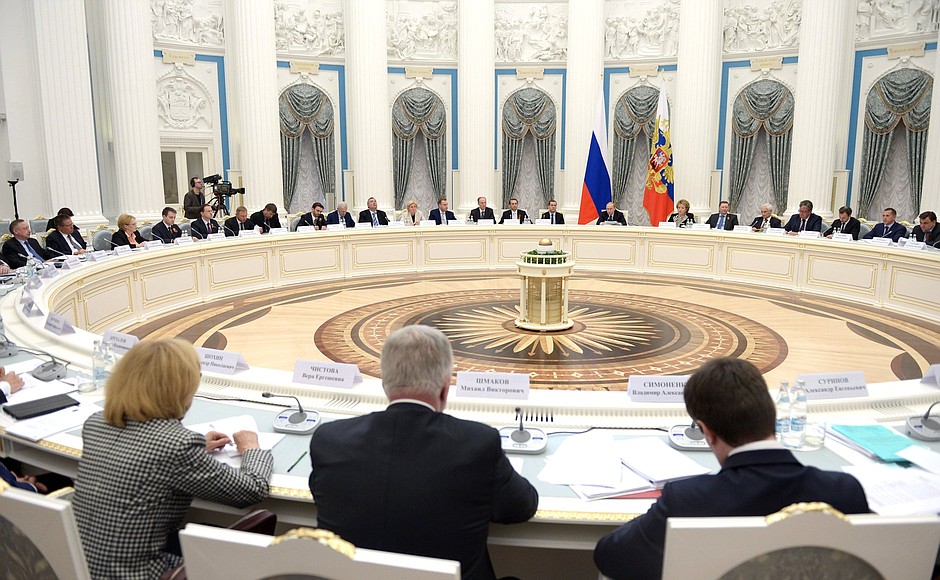
The agenda focussed on the implementation of the May 2012 Presidential Executive Orders in the social sphere: healthcare, education and labour remuneration.
Labour and Social Protection Minister Maxim Topilin, Healthcare Minister Veronika Skvortsova and Education and Science Minister Dmitry Livanov presented their reports.
* * *
President of Russia Vladimir Putin: Good afternoon, colleagues.
As you know, the so-called May Executive Orders were signed exactly three years ago, setting targets for the following years.
We have already come halfway. It is important now to review our progress once again, analyse what has been done and what has not, find out the reasons and think of ways to make our work more efficient to ensure that we meet the targets.
I would like to stress that the most important thing is not to assess the quality of our work in terms of the number of resolutions, documents, plans and even laws passed but to look at the changes in people’s lives, improvements in the business environment, changes in the social sphere and so forth.
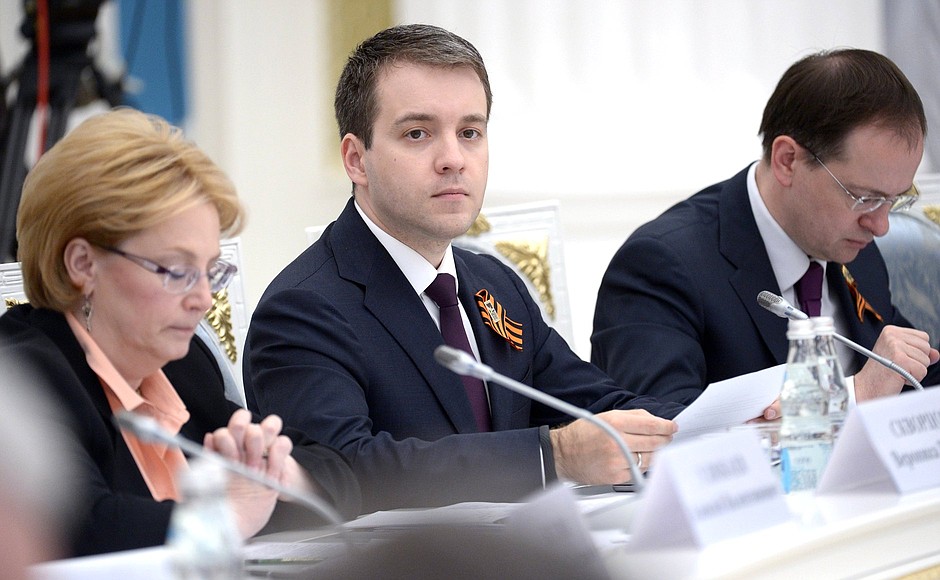
I will begin with one key area – demographics. Last year we again registered a natural growth in our population. The birth rate has gone up. There are more Russian families with two or three children. The so-called aggregate birth rate has nearly reached the level planned for 2018.
The creation of up-to-date perinatal centres has made it possible to reduce child mortality to a historic minimum for this country. This is a truly great achievement, considering that since 2012 our doctors have been nursing to health infants with an extremely low body weight.
I would like to stress that the most important thing is not to assess the quality of our work in terms of the number of resolutions, documents, plans and even laws passed but to look at the changes in people’s lives, improvements in the business environment, changes in the social sphere and so forth.
The death rate has been falling consistently over the past almost 10 years. For the first time Russia has been given a positive rating in the global healthcare ranking. The average lifespan has reached almost 71 years (70.93).
What would I like to highlight here? First, that as we all know, due to the demographic drop in the 1990s the number of women of the reproductive age is decreasing. There is nothing we can do about this. I will get back to this later, but I would like to ask appropriate agencies (the Healthcare Ministry and the relevant statistical services) to bear this in mind and provide net figures that would not simply show the number of children born, but would tie that figure in with the population structure and age groups. This is the only way to assess the quality of our work. There is nothing we can do about the demographic drop of the 1990s, but we must improve the quality of our efforts. There are problems here that I will mention further.
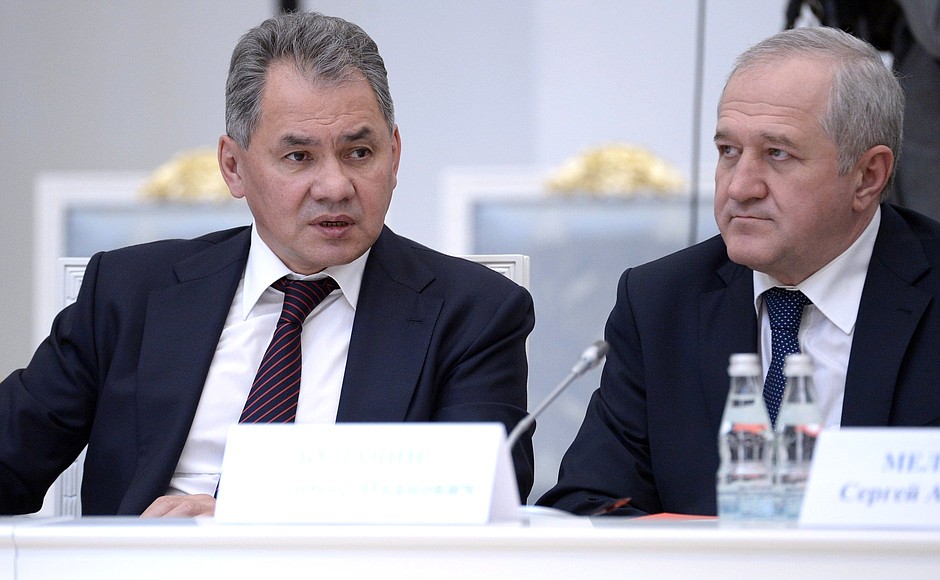
What else? The death rate has stabilised in the past months, and has even grown slightly, unfortunately. What are the reasons? A greater lifespan has changed the population structure, as I already said. The share of elderly people has grown. According to experts, this had a direct effect on mortality dynamics. It is natural that older people pass more frequently than young ones, than able-bodied people do; the difference is significant. I would like to ask the Healthcare Ministry to keep track of this.
The creation of up-to-date perinatal centres has made it possible to reduce child mortality to a historic minimum for this country. This is a truly great achievement.
I want to stress that in order to meet the challenges posed by the changing demographics we must make additional efforts to reduce the death rate and carry on with the birth rate support programmes. The preservation of our nation has been and remains a key task that all levels of authority should focus on.
The social sphere should play a special role in maintaining the positive demographic tendencies. A lot has been done here to improve workforce capacity and the quality of services in healthcare, education and social services. The overall status and living standards of experts in these important areas have grown. The jobs of a doctor and a teacher are becoming prestigious and attractive.
I would like to single out the significant role of the regions in the practical implementation of our resolutions. A vast majority of the regions have ensured salaries for doctors, teachers and professors that match the average in the economy, while the number of inefficient organisations that fail to provide adequate services to the public has gone down. A great deal has been done; some of it was painful, but it was all necessary.
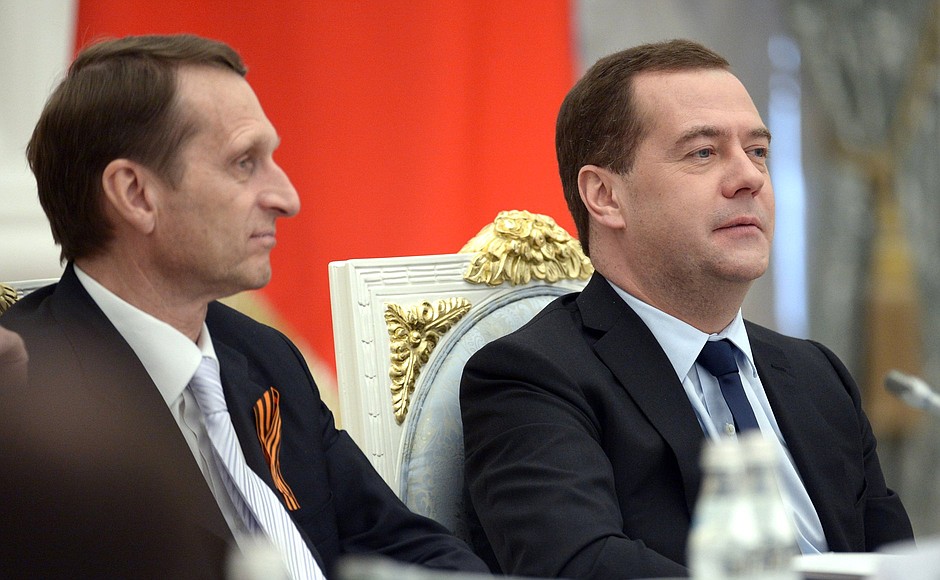
At the same time I would like to stress that we should not merely state that we are doing important things, but do them wisely. This is something I would like to draw the attention of ministries, agencies and regions to. It is inadmissible to reduce access to socially significant services, when under the guise of optimisation we reduce the number of beds in hospitals, the number of rural health posts, ambulance stations, cultural centres and facilities providing extracurricular education for children.
We need to establish strict control over the optimisation of public organisations, especially in remote and rural areas. This is a serious topic, colleagues, that I am drawing your attention to. I would like to ask the Accounts Chamber to prepare a special report on the accessibility of social services for the public. We will consider it at our meeting with the Government.
I want to stress that in order to meet the challenges posed by the changing demographics we must make additional efforts to reduce the death rate and carry on with the birth rate support programmes. The preservation of our nation has been and remains a key task that all levels of authority should focus on.
The next area is development of preschool education. I have to say that we have made significant progress here. Additional preschools have been made available for over 1 million children. Next year practically all the regions will be able to provide preschool education for children aged 3 to 7. However, it is not enough to simply build a facility. We must provide comfortable conditions for the children and ensure a proper level of education to get them ready for school. Therefore, special attention must be given to the professional training of teachers and all the experts involved in preschool education.
At the same time, every family should have the opportunity to enrol their child at such a facility online – this is another thing we often speak about. The mechanism of online enrolment should be transparent, ensuring the child is accepted. I would like to ask the Education and Science Minister to inform us today of work to develop preschool education and of online enrolment.
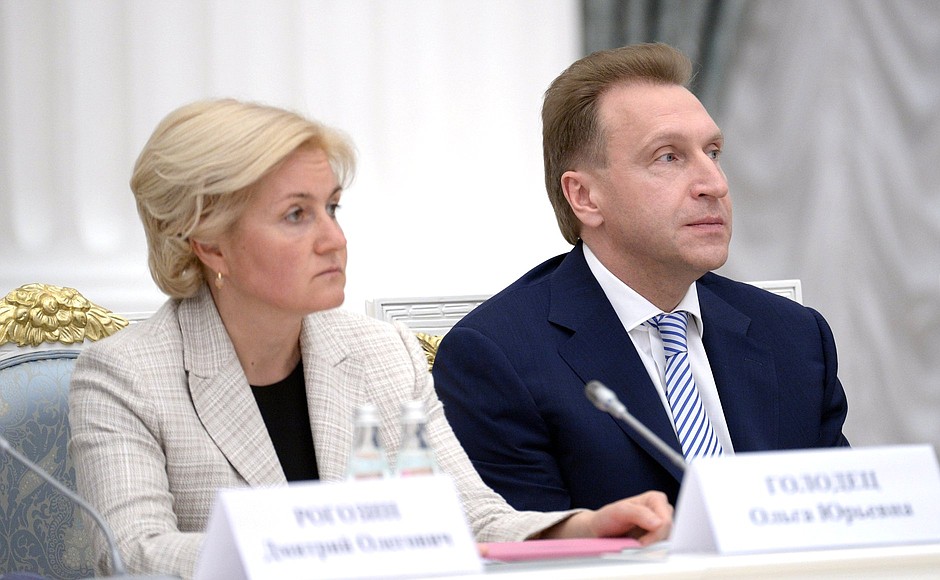
I would like to note the overall positive changes in education. The National Final School Exam is becoming more objective. The public discussion around this issue continues, we should not dot the i’s yet, but there is some progress here. We are developing a system of support for talented children, the international prestige of our leading universities is growing, and our system of higher learning is consistently getting rid of the so-called pseudo-universities.
We have made advances in other areas as well. There are currently 1,823 multifunctional centres where 64 percent of the population can receive popular services on a one-stop basis. I expect work to create such multifunctional centres to be completed by the end of this year.
We are gradually enhancing employment for the disabled by creating special jobs for them, though we all know that there is still plenty to do here. These issues are being resolved very slowly and in a complicated way, though some measures to support children and adults with disabilities are being implemented.
I would like to single out the significant role of the regions in the practical implementation of our resolutions. A vast majority of the regions have ensured salaries for doctors, teachers and professors that match the average in the economy, while the number of inefficient organisations that fail to provide adequate services to the public has gone down.
The programme to resettle people from unfit housing is now working; rather, it has been revived. A majority of regions are coping. I would like to note that we see tangible results in those areas where the targets set in the Executive Orders became a real priority for the local authorities of all levels, where the federal centre and the regions are acting in a concerted fashion, making their way towards the targets together and with the support of the public. It is necessary to carry on with all the modifications that were launched, to make them systematic so that the citizens could see the positive changes in all spheres of life.
A key factor of our progress is, of course, the civic stance and initiative of the people. Business associations and Russian Popular Front activists should play a key role in implementing our plans. Unfortunately, they often have to force the bureaucrats to work for tangible results, to promptly pass resolutions that the country and society need, monitoring the implementation of the tasks set in the Executive Orders. I expect the participation of the public in our efforts to grow, especially given that this year we are introducing an independent assessment of the quality of social services. This applies to hospitals, outpatient clinics, schools and preschool facilities. This should significantly stimulate the development of the entire social sphere in Russia.
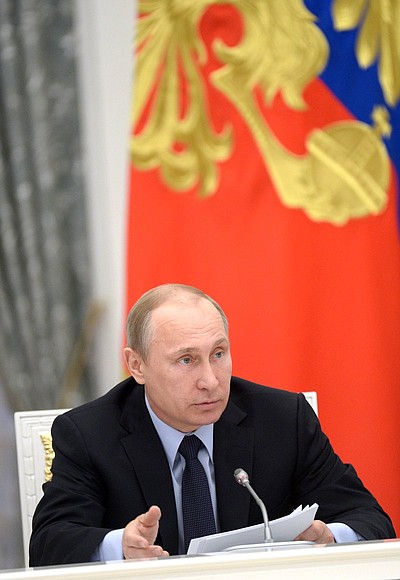
Colleagues,
The May [2012] Executive Orders set the strategic goals for Russia’s development. Achieving them would ensure the dynamic development and self-sufficiency of the nation and prosperity of Russian citizens. This is the best response to the challenges we are facing. The current difficulties should stimulate us to find reserves and out-of-the-box solutions for a more economical and focussed use of resources. At the same time, the Executive Orders were put together in a different economic and foreign policy environment. We all know this; we should understand it and take it into account. Now we are working in conditions of a series of restrictions. The solution of certain problems may require more time for objective reasons, but the most important thing is to find the resources. We have them.
We need to establish strict control over the optimisation of public organisations, especially in remote and rural areas. This is a serious topic, colleagues, that I am drawing your attention to. I would like to ask the Accounts Chamber to prepare a special report on the accessibility of social services for the public. We will consider it at our meeting with the Government.
I would like to stress right away that we must maintain the levels we have already achieved, for instance in salary levels, and not allow any fall-back. Obviously, in the current conditions, certain local and federal authorities may be tempted to minimise their targets or generally use the changing situation as an excuse for their inefficiency, thus shifting the responsibility.
I would like to say the following here. We truly have done a lot, but in a number of areas the results are still insufficient, and this is not due to some external conditions, though they do exist, this is a fact, but mainly to internal issues. Sometimes work is reduced to writing plans and instructions. There is no understanding of the real situation behind this, no desire to complete the job and achieve tangible results.
A key factor of our progress is, of course, the civic stance and initiative of the people. Business associations and Russian Popular Front activists should play a key role in implementing our plans. Unfortunately, they often have to force the bureaucrats to work for tangible results, to promptly pass resolutions that the country and society need, monitoring the implementation of the tasks set in the Executive Orders. I expect the participation of the public in our efforts to grow.
I would like to reiterate that the Executive Orders were signed three years ago. Rather than report on the plans we made, we should be speaking of real change in people’s lives, in the life of society.
We are still failing to utilise the key reserve of economic development, which is labour productivity growth. The year-end growth in 2014 was only 0.5 percent, while in the first quarter of this year it even went down. We all understand that this is the key, everything depends on it: economic development, achieving its required growth rates and eventually meeting social targets.
I would like to remind you that our objective is to raise labour productivity 1.5 times by 2018 compared to 2011. This means it should grow by more than 6 percent every year.
It is clear that, as I already said, there is a desire to blame it on the crisis, on the investment downturn. Let’s take manufacturing industries as an example. Though they experience pressure from external factors, they are nevertheless achieving concrete, positive, fairly significant results. Labour efficiency at large and medium-sized enterprises grew by 5.3%. In other words, we almost reached our target level.
In the areas where people don’t blame the difficulties, but instead try to resolve these problems, they were able to achieve double-digit growth figures in labour efficiency. Growth at the ten largest defence enterprises was over 20%. Of course, we have a programme to support and re-equip the defence industry with significant resources allocate towards it, nearly 3 trillion rubles. But this does not mean we have no reserves in the civilian sectors and there are no opportunities to provide the corresponding momentum we need.
Why can’t we achieve stable growth in labour efficiency throughout the entire economy? In part because we still do not have effective business incentives. We need to renew them and eliminate outdated mechanisms that impede development. We need to create new high-tech jobs, as we have talked about many times, and get rid of outdated equipment.
I will also note that the executive orders set the task of supporting medium-sized businesses, creating conditions for investment in new productions. But unfortunately, many decisions still exist only on paper. That includes providing state guarantees on loans. Given objective financial resources limitation, important steps have not been taken that were aimed at ensuring the efficient spending of budgetary funds. Thus, the mechanism of technological audit and cost analysis of investment projects implemented using public funds is still being used only occasionally and formally. And we still do not have any real savings.
Today’s situation requires precise and quick response measures by the government. In this respect, I would like to touch on the problem of providing medicines. Here, we have serious problems as was demonstrated during the Direct Line with citizens. The Healthcare minister reported to me that the Government allocated the necessary resources in due time – an extra 16 billion rubles. But the Ministry does not even want to take that money from the Finance Ministry, because it feels all the necessary pharmaceuticals including from that category are already available. So the question is, why aren’t they reaching citizens then?
People entitled to get vitally important medicines for free are forced to spend weeks waiting to those medicines to reach the pharmacy. I will give a few figures. According to data from the Russian Popular Front, more than 50% of citizens entitled to benefits note that vital medicines are not always available in pharmacies and they have to wait for them, seek them out, or even order them additionally. I am asking the Healthcare Ministry to tell us in detail today about what has been done most recently – I know that you planned certain steps in this area – or what needs to be done in the immediate future.
And another important topic that I would like discuss separately. The executive orders set an objective to reduce road accident mortality. Thanks to active, targeted efforts by the Government and the regions in 2007–2009, including within the framework of national projects, we were able to change those statistics significantly for the better.
But recently, we have not seen any serious shifts, and road deaths are not decreasing. Of course, the lack of positive momentum could be explained by a 20% increase in the number of cars on the roads over the last three years. But first and foremost, it means we need additional efforts to reduce the number of road accident deaths.
I ask the Government to seriously work on this problem. I also think this problem should be discussed at the State Council level. Together with regional governors and political party leaders, we need to develop extra measures to reduce the number of road fatalities.
Before we move on, I would like to repeat again that we must fulfil everything we promised our citizens, every commitment we undertook. We must strive to do everything we agreed upon. I already said this and will stress it again: it is clear that the situation has changed, and it is clear that the executive orders were drafted, prepared and adopted in a different economic and foreign trade situation. And of course, we must make adjustments.
But I have already said, and want to say it again, that we still need to do it. If we need to shift or postpone anything tactically, then we need to say so clearly and directly, to explain what is happening and why, and to say what will be done in the immediate future, how it will be done, and when certain indicators will be achieved. Let’s talk about this in more detail.
And, of course, we cannot approach it formally. I already talked about optimisation of, for example, the healthcare system. But in some of our regions, the number of rural paramedic centres has not increased, but decreased. This is simply unacceptable. Colleagues simply cut corners. They need to show that they have optimised the system, so they fix the easiest parts, and that’s it. But how are people supposed to live there? How can they receive basic medical assistance? Nobody is thinking about that.
Let’s discuss this in more detail.
<…>


